Organisational Behaviour Report: Tesco's Culture, Politics, and Power
VerifiedAdded on 2023/01/19
|16
|4870
|54
Report
AI Summary
This report provides a comprehensive analysis of organisational behaviour, focusing on the case of Tesco. It delves into how organisational culture, politics, and power dynamics influence individual and team behaviour and performance, using Handy's cultural typology and French and Raven's power model to illustrate these concepts. The report evaluates content and process theories of motivation, including Maslow's hierarchy of needs and McClelland's theory, offering insights into employee motivation. Furthermore, it explores the characteristics of effective and ineffective teams. The report applies these organisational behaviour concepts within the context of Tesco, providing a critical analysis of the impacts of culture, politics, and power on organisational outcomes. The conclusion summarizes the key findings and recommendations for Tesco, offering a practical application of the theoretical concepts discussed throughout the report.
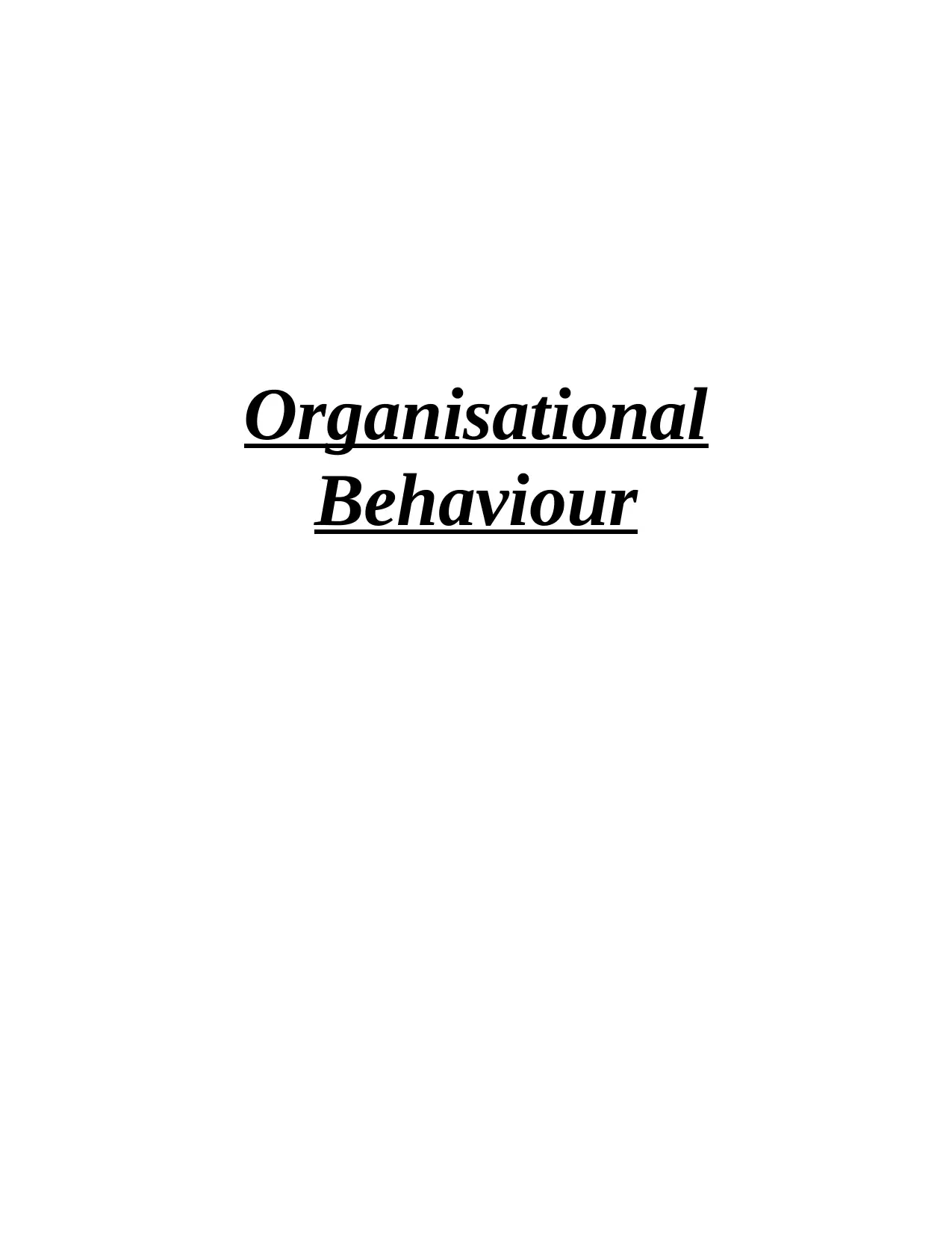
Organisational
Behaviour
Behaviour
Paraphrase This Document
Need a fresh take? Get an instant paraphrase of this document with our AI Paraphraser
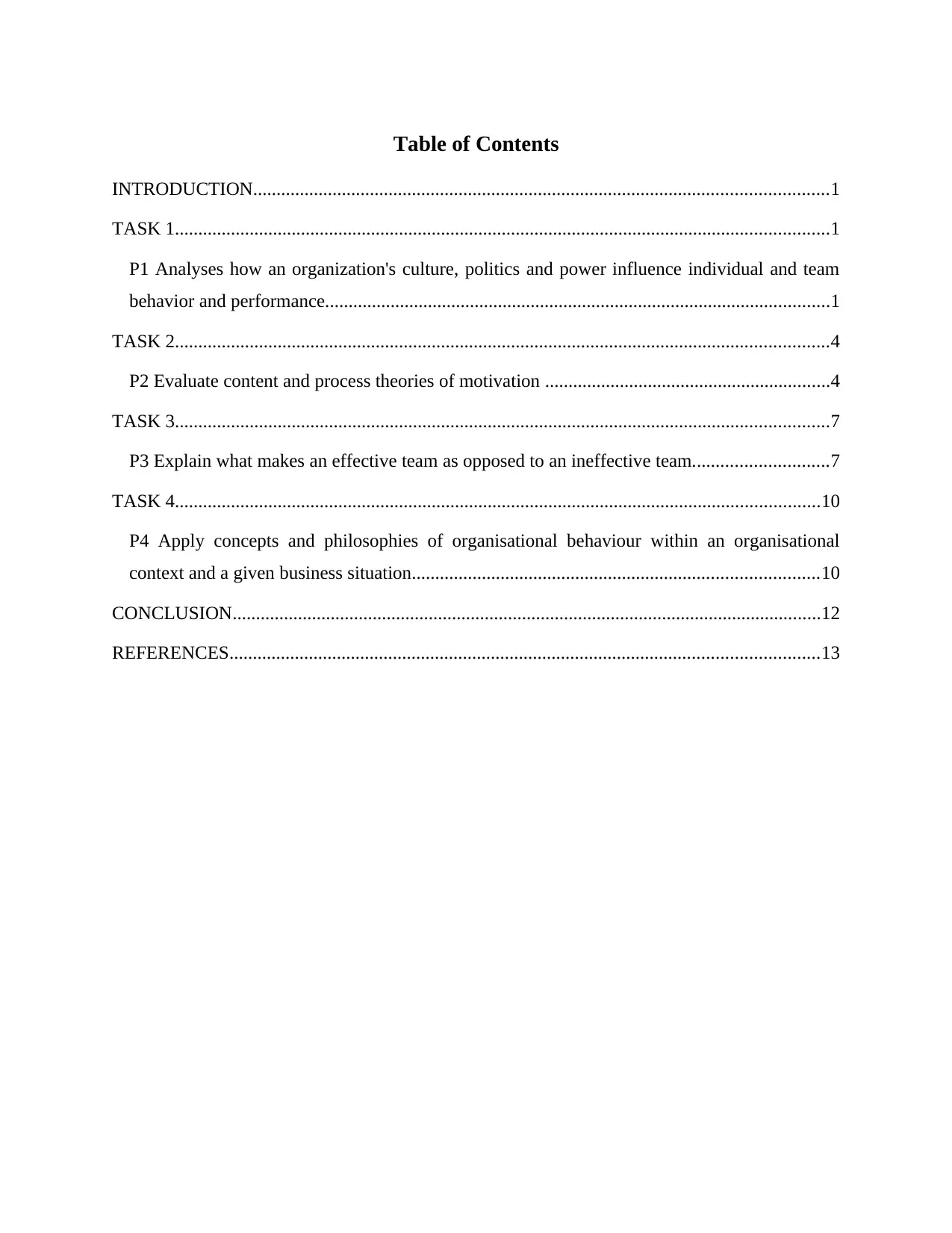
Table of Contents
INTRODUCTION...........................................................................................................................1
TASK 1............................................................................................................................................1
P1 Analyses how an organization's culture, politics and power influence individual and team
behavior and performance............................................................................................................1
TASK 2............................................................................................................................................4
P2 Evaluate content and process theories of motivation .............................................................4
TASK 3............................................................................................................................................7
P3 Explain what makes an effective team as opposed to an ineffective team.............................7
TASK 4..........................................................................................................................................10
P4 Apply concepts and philosophies of organisational behaviour within an organisational
context and a given business situation.......................................................................................10
CONCLUSION..............................................................................................................................12
REFERENCES..............................................................................................................................13
INTRODUCTION...........................................................................................................................1
TASK 1............................................................................................................................................1
P1 Analyses how an organization's culture, politics and power influence individual and team
behavior and performance............................................................................................................1
TASK 2............................................................................................................................................4
P2 Evaluate content and process theories of motivation .............................................................4
TASK 3............................................................................................................................................7
P3 Explain what makes an effective team as opposed to an ineffective team.............................7
TASK 4..........................................................................................................................................10
P4 Apply concepts and philosophies of organisational behaviour within an organisational
context and a given business situation.......................................................................................10
CONCLUSION..............................................................................................................................12
REFERENCES..............................................................................................................................13

⊘ This is a preview!⊘
Do you want full access?
Subscribe today to unlock all pages.

Trusted by 1+ million students worldwide
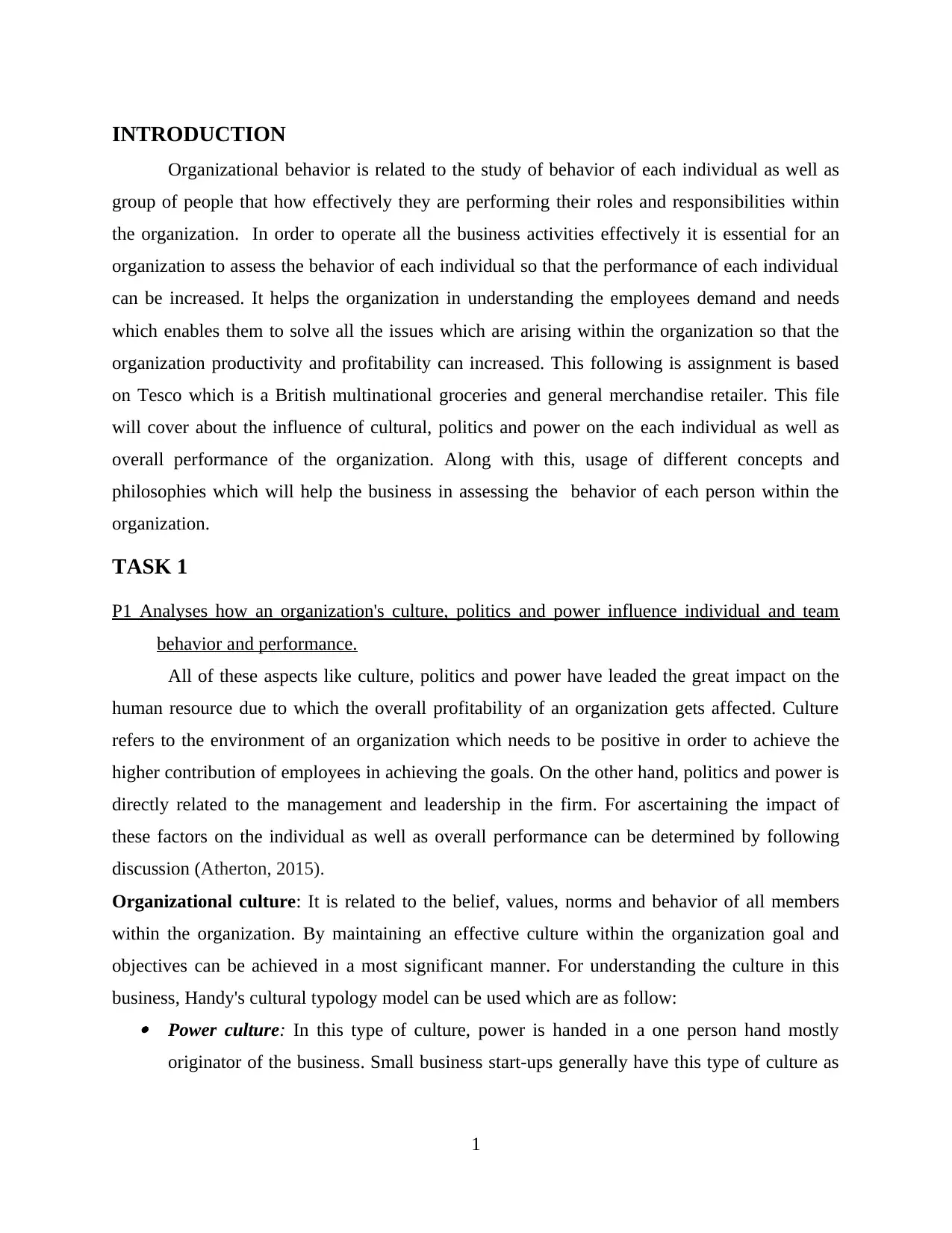
INTRODUCTION
Organizational behavior is related to the study of behavior of each individual as well as
group of people that how effectively they are performing their roles and responsibilities within
the organization. In order to operate all the business activities effectively it is essential for an
organization to assess the behavior of each individual so that the performance of each individual
can be increased. It helps the organization in understanding the employees demand and needs
which enables them to solve all the issues which are arising within the organization so that the
organization productivity and profitability can increased. This following is assignment is based
on Tesco which is a British multinational groceries and general merchandise retailer. This file
will cover about the influence of cultural, politics and power on the each individual as well as
overall performance of the organization. Along with this, usage of different concepts and
philosophies which will help the business in assessing the behavior of each person within the
organization.
TASK 1
P1 Analyses how an organization's culture, politics and power influence individual and team
behavior and performance.
All of these aspects like culture, politics and power have leaded the great impact on the
human resource due to which the overall profitability of an organization gets affected. Culture
refers to the environment of an organization which needs to be positive in order to achieve the
higher contribution of employees in achieving the goals. On the other hand, politics and power is
directly related to the management and leadership in the firm. For ascertaining the impact of
these factors on the individual as well as overall performance can be determined by following
discussion (Atherton, 2015).
Organizational culture: It is related to the belief, values, norms and behavior of all members
within the organization. By maintaining an effective culture within the organization goal and
objectives can be achieved in a most significant manner. For understanding the culture in this
business, Handy's cultural typology model can be used which are as follow: Power culture: In this type of culture, power is handed in a one person hand mostly
originator of the business. Small business start-ups generally have this type of culture as
1
Organizational behavior is related to the study of behavior of each individual as well as
group of people that how effectively they are performing their roles and responsibilities within
the organization. In order to operate all the business activities effectively it is essential for an
organization to assess the behavior of each individual so that the performance of each individual
can be increased. It helps the organization in understanding the employees demand and needs
which enables them to solve all the issues which are arising within the organization so that the
organization productivity and profitability can increased. This following is assignment is based
on Tesco which is a British multinational groceries and general merchandise retailer. This file
will cover about the influence of cultural, politics and power on the each individual as well as
overall performance of the organization. Along with this, usage of different concepts and
philosophies which will help the business in assessing the behavior of each person within the
organization.
TASK 1
P1 Analyses how an organization's culture, politics and power influence individual and team
behavior and performance.
All of these aspects like culture, politics and power have leaded the great impact on the
human resource due to which the overall profitability of an organization gets affected. Culture
refers to the environment of an organization which needs to be positive in order to achieve the
higher contribution of employees in achieving the goals. On the other hand, politics and power is
directly related to the management and leadership in the firm. For ascertaining the impact of
these factors on the individual as well as overall performance can be determined by following
discussion (Atherton, 2015).
Organizational culture: It is related to the belief, values, norms and behavior of all members
within the organization. By maintaining an effective culture within the organization goal and
objectives can be achieved in a most significant manner. For understanding the culture in this
business, Handy's cultural typology model can be used which are as follow: Power culture: In this type of culture, power is handed in a one person hand mostly
originator of the business. Small business start-ups generally have this type of culture as
1
Paraphrase This Document
Need a fresh take? Get an instant paraphrase of this document with our AI Paraphraser
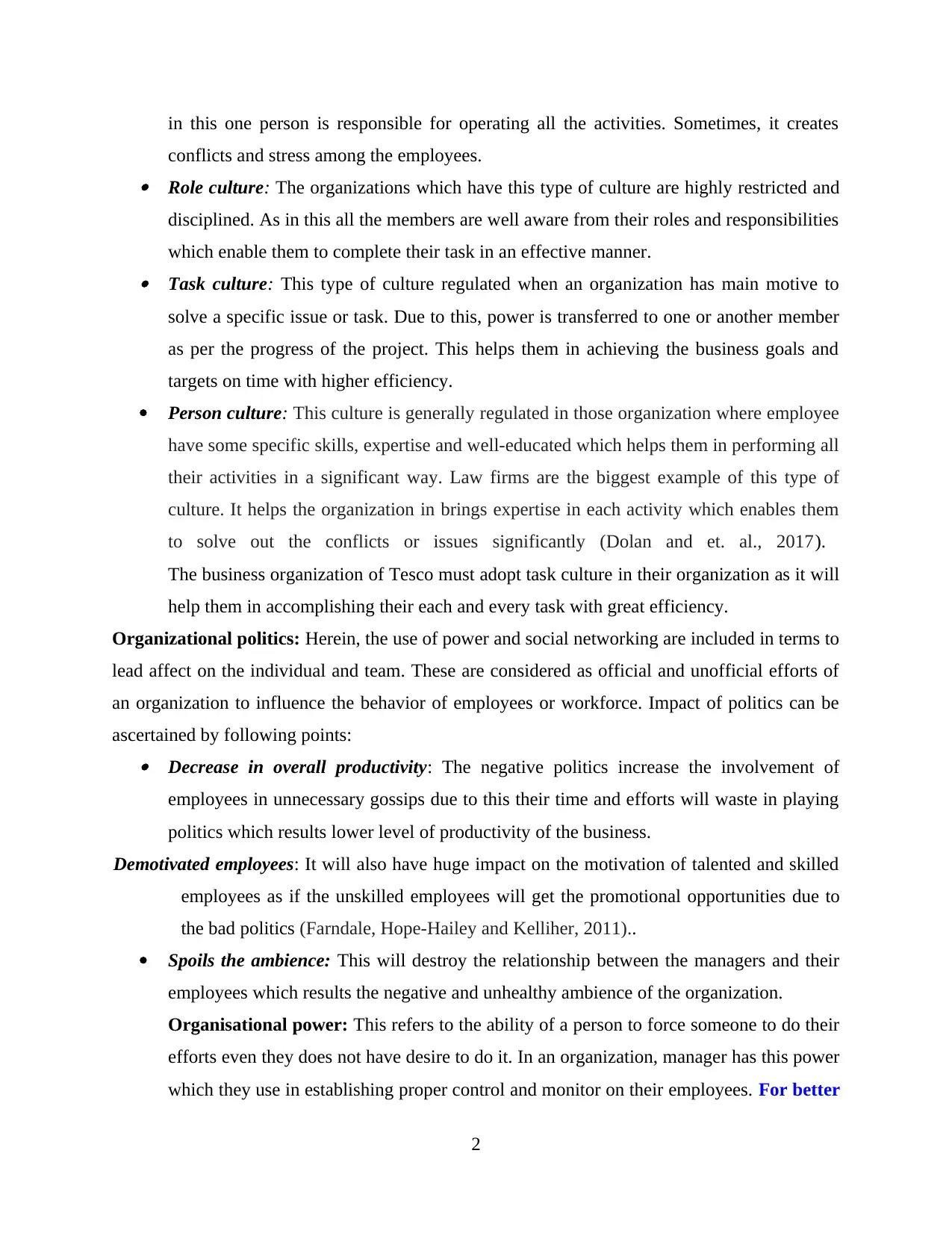
in this one person is responsible for operating all the activities. Sometimes, it creates
conflicts and stress among the employees. Role culture: The organizations which have this type of culture are highly restricted and
disciplined. As in this all the members are well aware from their roles and responsibilities
which enable them to complete their task in an effective manner. Task culture: This type of culture regulated when an organization has main motive to
solve a specific issue or task. Due to this, power is transferred to one or another member
as per the progress of the project. This helps them in achieving the business goals and
targets on time with higher efficiency.
Person culture: This culture is generally regulated in those organization where employee
have some specific skills, expertise and well-educated which helps them in performing all
their activities in a significant way. Law firms are the biggest example of this type of
culture. It helps the organization in brings expertise in each activity which enables them
to solve out the conflicts or issues significantly (Dolan and et. al., 2017).
The business organization of Tesco must adopt task culture in their organization as it will
help them in accomplishing their each and every task with great efficiency.
Organizational politics: Herein, the use of power and social networking are included in terms to
lead affect on the individual and team. These are considered as official and unofficial efforts of
an organization to influence the behavior of employees or workforce. Impact of politics can be
ascertained by following points: Decrease in overall productivity: The negative politics increase the involvement of
employees in unnecessary gossips due to this their time and efforts will waste in playing
politics which results lower level of productivity of the business.
Demotivated employees: It will also have huge impact on the motivation of talented and skilled
employees as if the unskilled employees will get the promotional opportunities due to
the bad politics (Farndale, Hope-Hailey and Kelliher, 2011)..
Spoils the ambience: This will destroy the relationship between the managers and their
employees which results the negative and unhealthy ambience of the organization.
Organisational power: This refers to the ability of a person to force someone to do their
efforts even they does not have desire to do it. In an organization, manager has this power
which they use in establishing proper control and monitor on their employees. For better
2
conflicts and stress among the employees. Role culture: The organizations which have this type of culture are highly restricted and
disciplined. As in this all the members are well aware from their roles and responsibilities
which enable them to complete their task in an effective manner. Task culture: This type of culture regulated when an organization has main motive to
solve a specific issue or task. Due to this, power is transferred to one or another member
as per the progress of the project. This helps them in achieving the business goals and
targets on time with higher efficiency.
Person culture: This culture is generally regulated in those organization where employee
have some specific skills, expertise and well-educated which helps them in performing all
their activities in a significant way. Law firms are the biggest example of this type of
culture. It helps the organization in brings expertise in each activity which enables them
to solve out the conflicts or issues significantly (Dolan and et. al., 2017).
The business organization of Tesco must adopt task culture in their organization as it will
help them in accomplishing their each and every task with great efficiency.
Organizational politics: Herein, the use of power and social networking are included in terms to
lead affect on the individual and team. These are considered as official and unofficial efforts of
an organization to influence the behavior of employees or workforce. Impact of politics can be
ascertained by following points: Decrease in overall productivity: The negative politics increase the involvement of
employees in unnecessary gossips due to this their time and efforts will waste in playing
politics which results lower level of productivity of the business.
Demotivated employees: It will also have huge impact on the motivation of talented and skilled
employees as if the unskilled employees will get the promotional opportunities due to
the bad politics (Farndale, Hope-Hailey and Kelliher, 2011)..
Spoils the ambience: This will destroy the relationship between the managers and their
employees which results the negative and unhealthy ambience of the organization.
Organisational power: This refers to the ability of a person to force someone to do their
efforts even they does not have desire to do it. In an organization, manager has this power
which they use in establishing proper control and monitor on their employees. For better
2
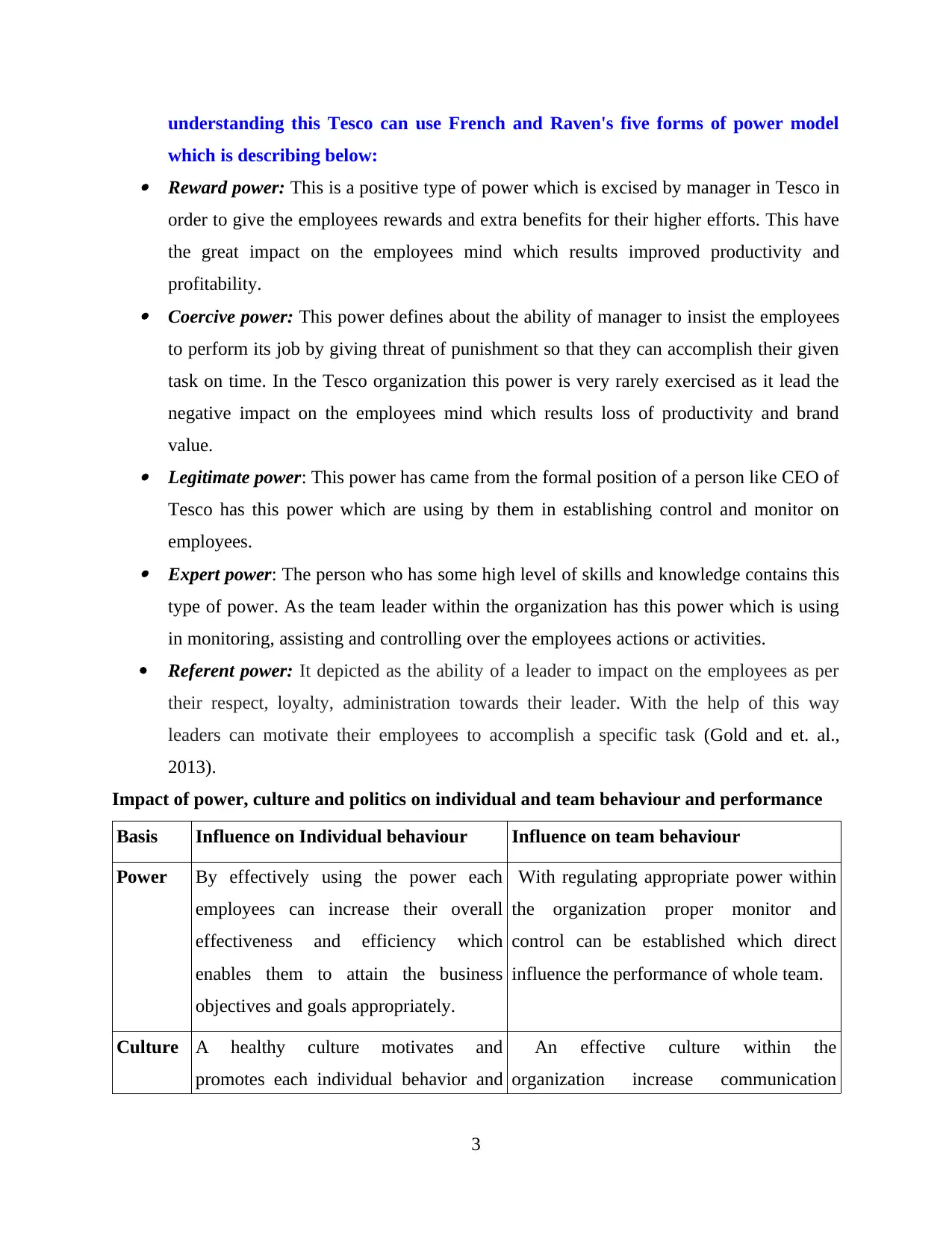
understanding this Tesco can use French and Raven's five forms of power model
which is describing below: Reward power: This is a positive type of power which is excised by manager in Tesco in
order to give the employees rewards and extra benefits for their higher efforts. This have
the great impact on the employees mind which results improved productivity and
profitability. Coercive power: This power defines about the ability of manager to insist the employees
to perform its job by giving threat of punishment so that they can accomplish their given
task on time. In the Tesco organization this power is very rarely exercised as it lead the
negative impact on the employees mind which results loss of productivity and brand
value. Legitimate power: This power has came from the formal position of a person like CEO of
Tesco has this power which are using by them in establishing control and monitor on
employees. Expert power: The person who has some high level of skills and knowledge contains this
type of power. As the team leader within the organization has this power which is using
in monitoring, assisting and controlling over the employees actions or activities.
Referent power: It depicted as the ability of a leader to impact on the employees as per
their respect, loyalty, administration towards their leader. With the help of this way
leaders can motivate their employees to accomplish a specific task (Gold and et. al.,
2013).
Impact of power, culture and politics on individual and team behaviour and performance
Basis Influence on Individual behaviour Influence on team behaviour
Power By effectively using the power each
employees can increase their overall
effectiveness and efficiency which
enables them to attain the business
objectives and goals appropriately.
With regulating appropriate power within
the organization proper monitor and
control can be established which direct
influence the performance of whole team.
Culture A healthy culture motivates and
promotes each individual behavior and
An effective culture within the
organization increase communication
3
which is describing below: Reward power: This is a positive type of power which is excised by manager in Tesco in
order to give the employees rewards and extra benefits for their higher efforts. This have
the great impact on the employees mind which results improved productivity and
profitability. Coercive power: This power defines about the ability of manager to insist the employees
to perform its job by giving threat of punishment so that they can accomplish their given
task on time. In the Tesco organization this power is very rarely exercised as it lead the
negative impact on the employees mind which results loss of productivity and brand
value. Legitimate power: This power has came from the formal position of a person like CEO of
Tesco has this power which are using by them in establishing control and monitor on
employees. Expert power: The person who has some high level of skills and knowledge contains this
type of power. As the team leader within the organization has this power which is using
in monitoring, assisting and controlling over the employees actions or activities.
Referent power: It depicted as the ability of a leader to impact on the employees as per
their respect, loyalty, administration towards their leader. With the help of this way
leaders can motivate their employees to accomplish a specific task (Gold and et. al.,
2013).
Impact of power, culture and politics on individual and team behaviour and performance
Basis Influence on Individual behaviour Influence on team behaviour
Power By effectively using the power each
employees can increase their overall
effectiveness and efficiency which
enables them to attain the business
objectives and goals appropriately.
With regulating appropriate power within
the organization proper monitor and
control can be established which direct
influence the performance of whole team.
Culture A healthy culture motivates and
promotes each individual behavior and
An effective culture within the
organization increase communication
3
⊘ This is a preview!⊘
Do you want full access?
Subscribe today to unlock all pages.

Trusted by 1+ million students worldwide
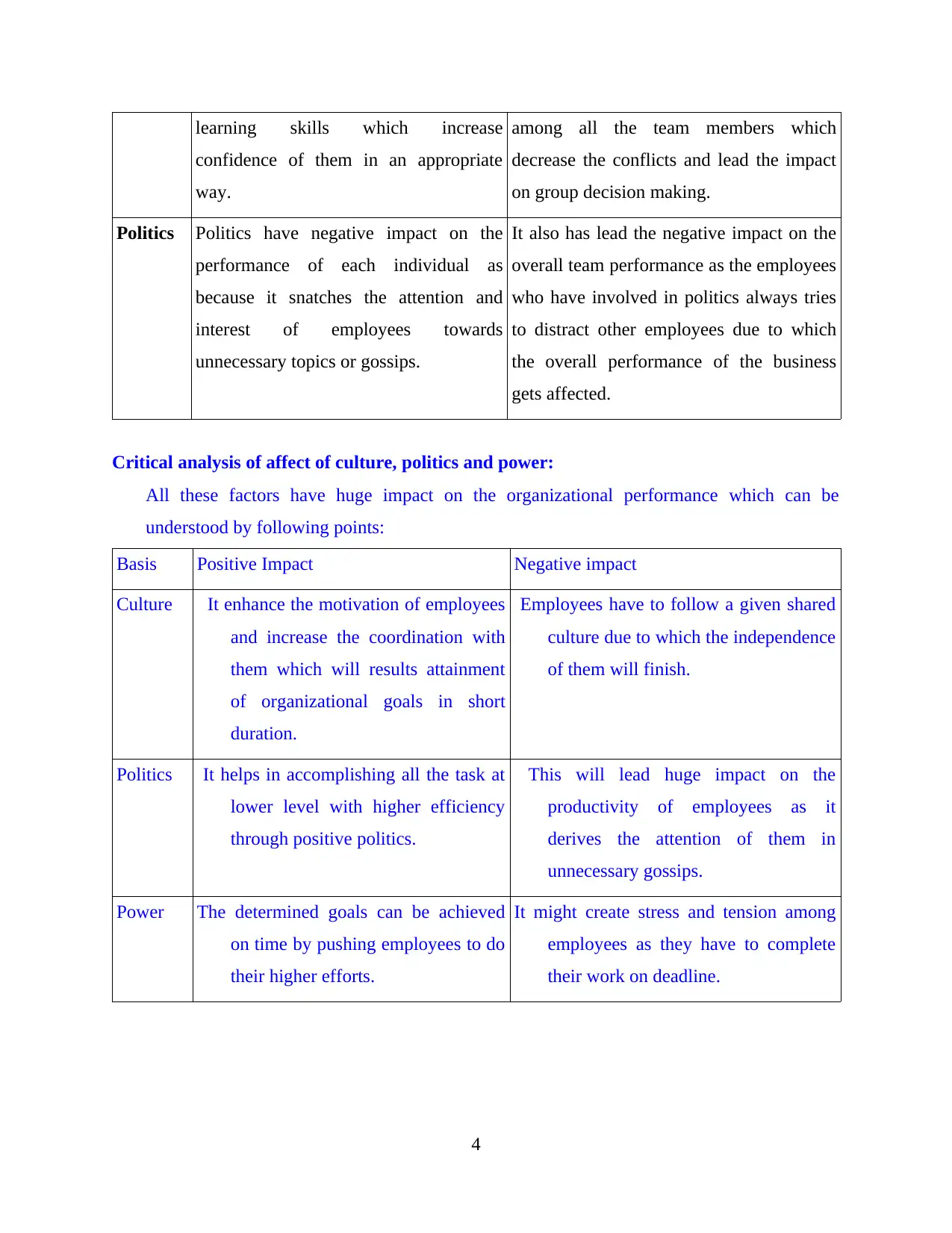
learning skills which increase
confidence of them in an appropriate
way.
among all the team members which
decrease the conflicts and lead the impact
on group decision making.
Politics Politics have negative impact on the
performance of each individual as
because it snatches the attention and
interest of employees towards
unnecessary topics or gossips.
It also has lead the negative impact on the
overall team performance as the employees
who have involved in politics always tries
to distract other employees due to which
the overall performance of the business
gets affected.
Critical analysis of affect of culture, politics and power:
All these factors have huge impact on the organizational performance which can be
understood by following points:
Basis Positive Impact Negative impact
Culture It enhance the motivation of employees
and increase the coordination with
them which will results attainment
of organizational goals in short
duration.
Employees have to follow a given shared
culture due to which the independence
of them will finish.
Politics It helps in accomplishing all the task at
lower level with higher efficiency
through positive politics.
This will lead huge impact on the
productivity of employees as it
derives the attention of them in
unnecessary gossips.
Power The determined goals can be achieved
on time by pushing employees to do
their higher efforts.
It might create stress and tension among
employees as they have to complete
their work on deadline.
4
confidence of them in an appropriate
way.
among all the team members which
decrease the conflicts and lead the impact
on group decision making.
Politics Politics have negative impact on the
performance of each individual as
because it snatches the attention and
interest of employees towards
unnecessary topics or gossips.
It also has lead the negative impact on the
overall team performance as the employees
who have involved in politics always tries
to distract other employees due to which
the overall performance of the business
gets affected.
Critical analysis of affect of culture, politics and power:
All these factors have huge impact on the organizational performance which can be
understood by following points:
Basis Positive Impact Negative impact
Culture It enhance the motivation of employees
and increase the coordination with
them which will results attainment
of organizational goals in short
duration.
Employees have to follow a given shared
culture due to which the independence
of them will finish.
Politics It helps in accomplishing all the task at
lower level with higher efficiency
through positive politics.
This will lead huge impact on the
productivity of employees as it
derives the attention of them in
unnecessary gossips.
Power The determined goals can be achieved
on time by pushing employees to do
their higher efforts.
It might create stress and tension among
employees as they have to complete
their work on deadline.
4
Paraphrase This Document
Need a fresh take? Get an instant paraphrase of this document with our AI Paraphraser
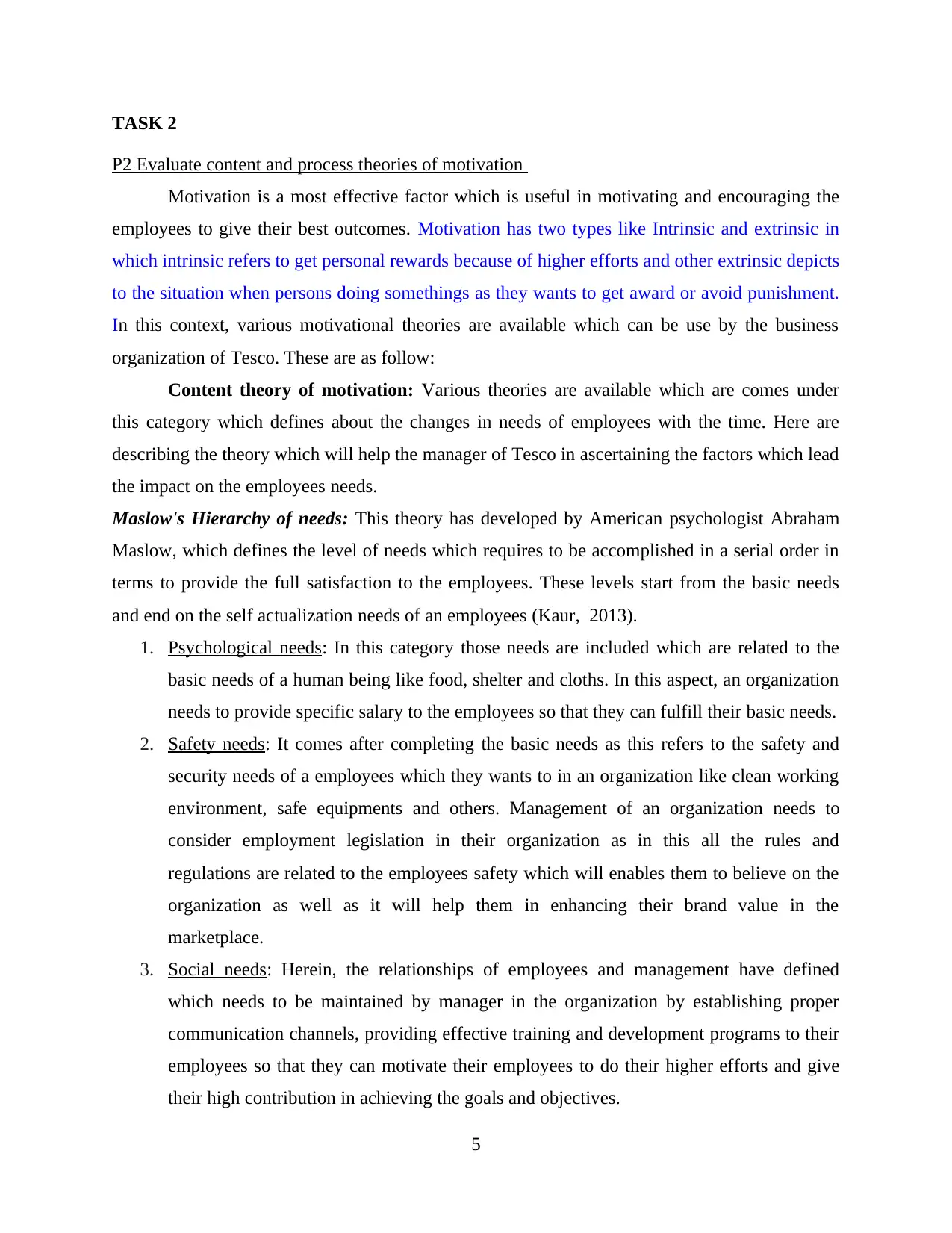
TASK 2
P2 Evaluate content and process theories of motivation
Motivation is a most effective factor which is useful in motivating and encouraging the
employees to give their best outcomes. Motivation has two types like Intrinsic and extrinsic in
which intrinsic refers to get personal rewards because of higher efforts and other extrinsic depicts
to the situation when persons doing somethings as they wants to get award or avoid punishment.
In this context, various motivational theories are available which can be use by the business
organization of Tesco. These are as follow:
Content theory of motivation: Various theories are available which are comes under
this category which defines about the changes in needs of employees with the time. Here are
describing the theory which will help the manager of Tesco in ascertaining the factors which lead
the impact on the employees needs.
Maslow's Hierarchy of needs: This theory has developed by American psychologist Abraham
Maslow, which defines the level of needs which requires to be accomplished in a serial order in
terms to provide the full satisfaction to the employees. These levels start from the basic needs
and end on the self actualization needs of an employees (Kaur, 2013).
1. Psychological needs: In this category those needs are included which are related to the
basic needs of a human being like food, shelter and cloths. In this aspect, an organization
needs to provide specific salary to the employees so that they can fulfill their basic needs.
2. Safety needs: It comes after completing the basic needs as this refers to the safety and
security needs of a employees which they wants to in an organization like clean working
environment, safe equipments and others. Management of an organization needs to
consider employment legislation in their organization as in this all the rules and
regulations are related to the employees safety which will enables them to believe on the
organization as well as it will help them in enhancing their brand value in the
marketplace.
3. Social needs: Herein, the relationships of employees and management have defined
which needs to be maintained by manager in the organization by establishing proper
communication channels, providing effective training and development programs to their
employees so that they can motivate their employees to do their higher efforts and give
their high contribution in achieving the goals and objectives.
5
P2 Evaluate content and process theories of motivation
Motivation is a most effective factor which is useful in motivating and encouraging the
employees to give their best outcomes. Motivation has two types like Intrinsic and extrinsic in
which intrinsic refers to get personal rewards because of higher efforts and other extrinsic depicts
to the situation when persons doing somethings as they wants to get award or avoid punishment.
In this context, various motivational theories are available which can be use by the business
organization of Tesco. These are as follow:
Content theory of motivation: Various theories are available which are comes under
this category which defines about the changes in needs of employees with the time. Here are
describing the theory which will help the manager of Tesco in ascertaining the factors which lead
the impact on the employees needs.
Maslow's Hierarchy of needs: This theory has developed by American psychologist Abraham
Maslow, which defines the level of needs which requires to be accomplished in a serial order in
terms to provide the full satisfaction to the employees. These levels start from the basic needs
and end on the self actualization needs of an employees (Kaur, 2013).
1. Psychological needs: In this category those needs are included which are related to the
basic needs of a human being like food, shelter and cloths. In this aspect, an organization
needs to provide specific salary to the employees so that they can fulfill their basic needs.
2. Safety needs: It comes after completing the basic needs as this refers to the safety and
security needs of a employees which they wants to in an organization like clean working
environment, safe equipments and others. Management of an organization needs to
consider employment legislation in their organization as in this all the rules and
regulations are related to the employees safety which will enables them to believe on the
organization as well as it will help them in enhancing their brand value in the
marketplace.
3. Social needs: Herein, the relationships of employees and management have defined
which needs to be maintained by manager in the organization by establishing proper
communication channels, providing effective training and development programs to their
employees so that they can motivate their employees to do their higher efforts and give
their high contribution in achieving the goals and objectives.
5
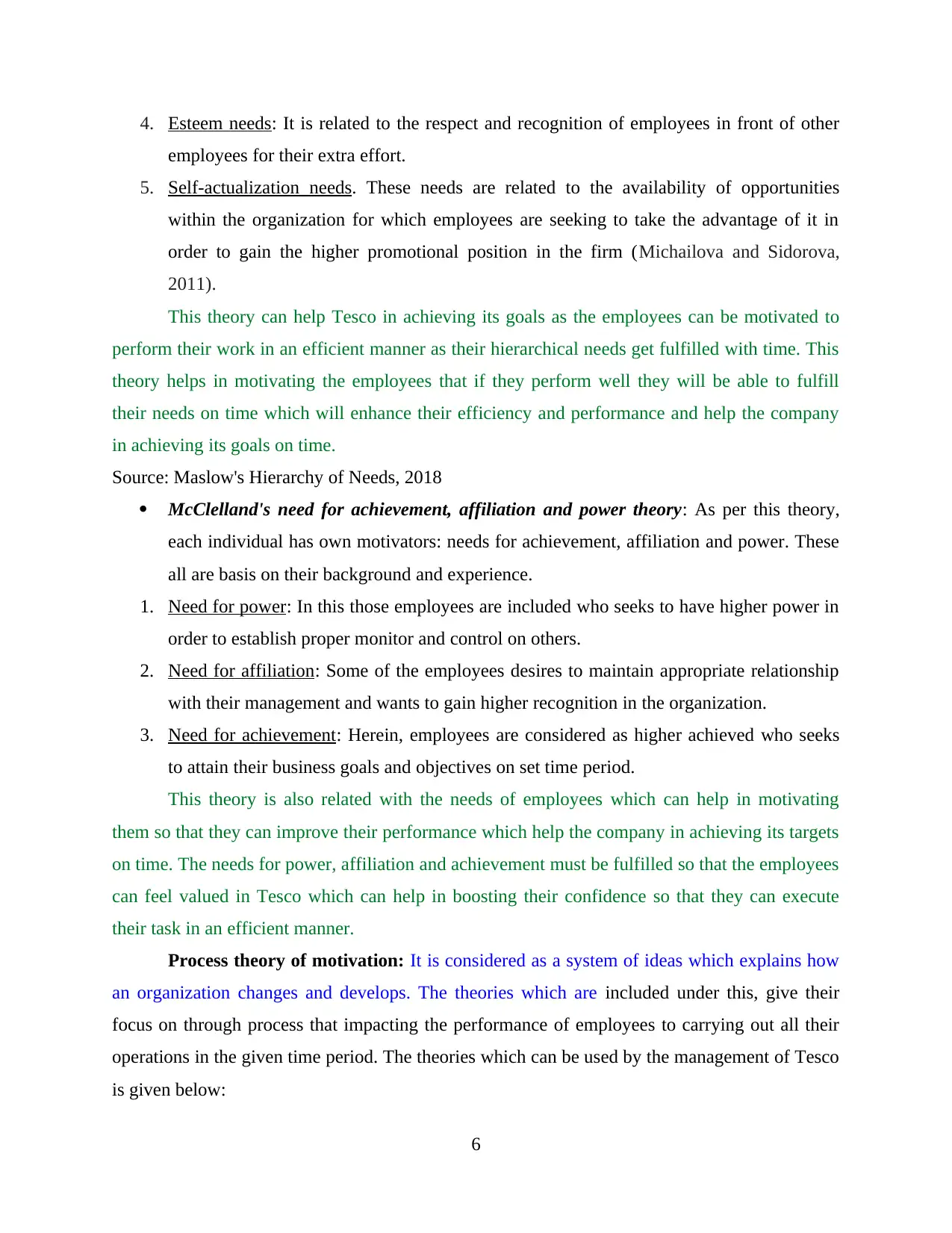
4. Esteem needs: It is related to the respect and recognition of employees in front of other
employees for their extra effort.
5. Self-actualization needs. These needs are related to the availability of opportunities
within the organization for which employees are seeking to take the advantage of it in
order to gain the higher promotional position in the firm (Michailova and Sidorova,
2011).
This theory can help Tesco in achieving its goals as the employees can be motivated to
perform their work in an efficient manner as their hierarchical needs get fulfilled with time. This
theory helps in motivating the employees that if they perform well they will be able to fulfill
their needs on time which will enhance their efficiency and performance and help the company
in achieving its goals on time.
Source: Maslow's Hierarchy of Needs, 2018
McClelland's need for achievement, affiliation and power theory: As per this theory,
each individual has own motivators: needs for achievement, affiliation and power. These
all are basis on their background and experience.
1. Need for power: In this those employees are included who seeks to have higher power in
order to establish proper monitor and control on others.
2. Need for affiliation: Some of the employees desires to maintain appropriate relationship
with their management and wants to gain higher recognition in the organization.
3. Need for achievement: Herein, employees are considered as higher achieved who seeks
to attain their business goals and objectives on set time period.
This theory is also related with the needs of employees which can help in motivating
them so that they can improve their performance which help the company in achieving its targets
on time. The needs for power, affiliation and achievement must be fulfilled so that the employees
can feel valued in Tesco which can help in boosting their confidence so that they can execute
their task in an efficient manner.
Process theory of motivation: It is considered as a system of ideas which explains how
an organization changes and develops. The theories which are included under this, give their
focus on through process that impacting the performance of employees to carrying out all their
operations in the given time period. The theories which can be used by the management of Tesco
is given below:
6
employees for their extra effort.
5. Self-actualization needs. These needs are related to the availability of opportunities
within the organization for which employees are seeking to take the advantage of it in
order to gain the higher promotional position in the firm (Michailova and Sidorova,
2011).
This theory can help Tesco in achieving its goals as the employees can be motivated to
perform their work in an efficient manner as their hierarchical needs get fulfilled with time. This
theory helps in motivating the employees that if they perform well they will be able to fulfill
their needs on time which will enhance their efficiency and performance and help the company
in achieving its goals on time.
Source: Maslow's Hierarchy of Needs, 2018
McClelland's need for achievement, affiliation and power theory: As per this theory,
each individual has own motivators: needs for achievement, affiliation and power. These
all are basis on their background and experience.
1. Need for power: In this those employees are included who seeks to have higher power in
order to establish proper monitor and control on others.
2. Need for affiliation: Some of the employees desires to maintain appropriate relationship
with their management and wants to gain higher recognition in the organization.
3. Need for achievement: Herein, employees are considered as higher achieved who seeks
to attain their business goals and objectives on set time period.
This theory is also related with the needs of employees which can help in motivating
them so that they can improve their performance which help the company in achieving its targets
on time. The needs for power, affiliation and achievement must be fulfilled so that the employees
can feel valued in Tesco which can help in boosting their confidence so that they can execute
their task in an efficient manner.
Process theory of motivation: It is considered as a system of ideas which explains how
an organization changes and develops. The theories which are included under this, give their
focus on through process that impacting the performance of employees to carrying out all their
operations in the given time period. The theories which can be used by the management of Tesco
is given below:
6
⊘ This is a preview!⊘
Do you want full access?
Subscribe today to unlock all pages.

Trusted by 1+ million students worldwide
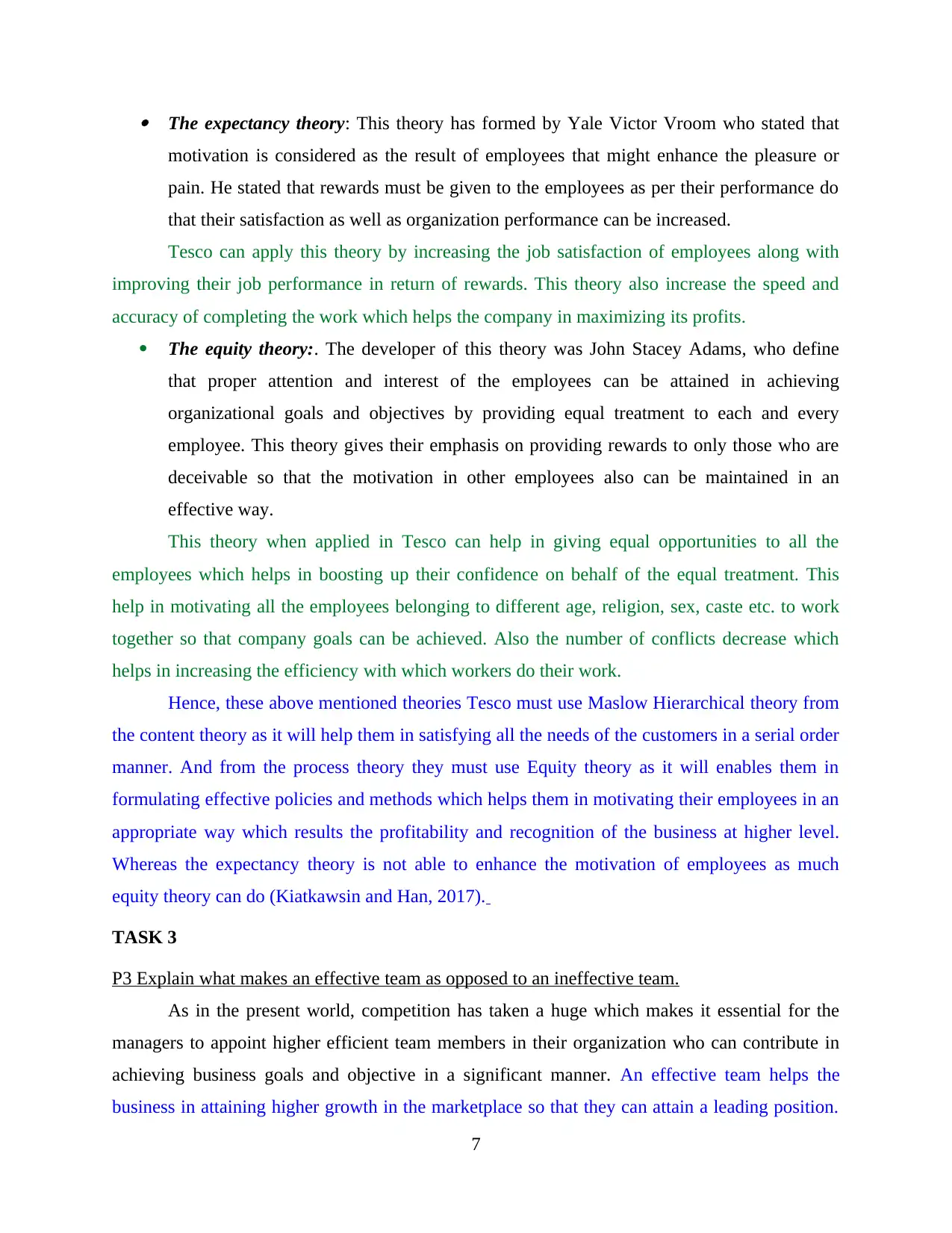
The expectancy theory: This theory has formed by Yale Victor Vroom who stated that
motivation is considered as the result of employees that might enhance the pleasure or
pain. He stated that rewards must be given to the employees as per their performance do
that their satisfaction as well as organization performance can be increased.
Tesco can apply this theory by increasing the job satisfaction of employees along with
improving their job performance in return of rewards. This theory also increase the speed and
accuracy of completing the work which helps the company in maximizing its profits.
The equity theory:. The developer of this theory was John Stacey Adams, who define
that proper attention and interest of the employees can be attained in achieving
organizational goals and objectives by providing equal treatment to each and every
employee. This theory gives their emphasis on providing rewards to only those who are
deceivable so that the motivation in other employees also can be maintained in an
effective way.
This theory when applied in Tesco can help in giving equal opportunities to all the
employees which helps in boosting up their confidence on behalf of the equal treatment. This
help in motivating all the employees belonging to different age, religion, sex, caste etc. to work
together so that company goals can be achieved. Also the number of conflicts decrease which
helps in increasing the efficiency with which workers do their work.
Hence, these above mentioned theories Tesco must use Maslow Hierarchical theory from
the content theory as it will help them in satisfying all the needs of the customers in a serial order
manner. And from the process theory they must use Equity theory as it will enables them in
formulating effective policies and methods which helps them in motivating their employees in an
appropriate way which results the profitability and recognition of the business at higher level.
Whereas the expectancy theory is not able to enhance the motivation of employees as much
equity theory can do (Kiatkawsin and Han, 2017).
TASK 3
P3 Explain what makes an effective team as opposed to an ineffective team.
As in the present world, competition has taken a huge which makes it essential for the
managers to appoint higher efficient team members in their organization who can contribute in
achieving business goals and objective in a significant manner. An effective team helps the
business in attaining higher growth in the marketplace so that they can attain a leading position.
7
motivation is considered as the result of employees that might enhance the pleasure or
pain. He stated that rewards must be given to the employees as per their performance do
that their satisfaction as well as organization performance can be increased.
Tesco can apply this theory by increasing the job satisfaction of employees along with
improving their job performance in return of rewards. This theory also increase the speed and
accuracy of completing the work which helps the company in maximizing its profits.
The equity theory:. The developer of this theory was John Stacey Adams, who define
that proper attention and interest of the employees can be attained in achieving
organizational goals and objectives by providing equal treatment to each and every
employee. This theory gives their emphasis on providing rewards to only those who are
deceivable so that the motivation in other employees also can be maintained in an
effective way.
This theory when applied in Tesco can help in giving equal opportunities to all the
employees which helps in boosting up their confidence on behalf of the equal treatment. This
help in motivating all the employees belonging to different age, religion, sex, caste etc. to work
together so that company goals can be achieved. Also the number of conflicts decrease which
helps in increasing the efficiency with which workers do their work.
Hence, these above mentioned theories Tesco must use Maslow Hierarchical theory from
the content theory as it will help them in satisfying all the needs of the customers in a serial order
manner. And from the process theory they must use Equity theory as it will enables them in
formulating effective policies and methods which helps them in motivating their employees in an
appropriate way which results the profitability and recognition of the business at higher level.
Whereas the expectancy theory is not able to enhance the motivation of employees as much
equity theory can do (Kiatkawsin and Han, 2017).
TASK 3
P3 Explain what makes an effective team as opposed to an ineffective team.
As in the present world, competition has taken a huge which makes it essential for the
managers to appoint higher efficient team members in their organization who can contribute in
achieving business goals and objective in a significant manner. An effective team helps the
business in attaining higher growth in the marketplace so that they can attain a leading position.
7
Paraphrase This Document
Need a fresh take? Get an instant paraphrase of this document with our AI Paraphraser
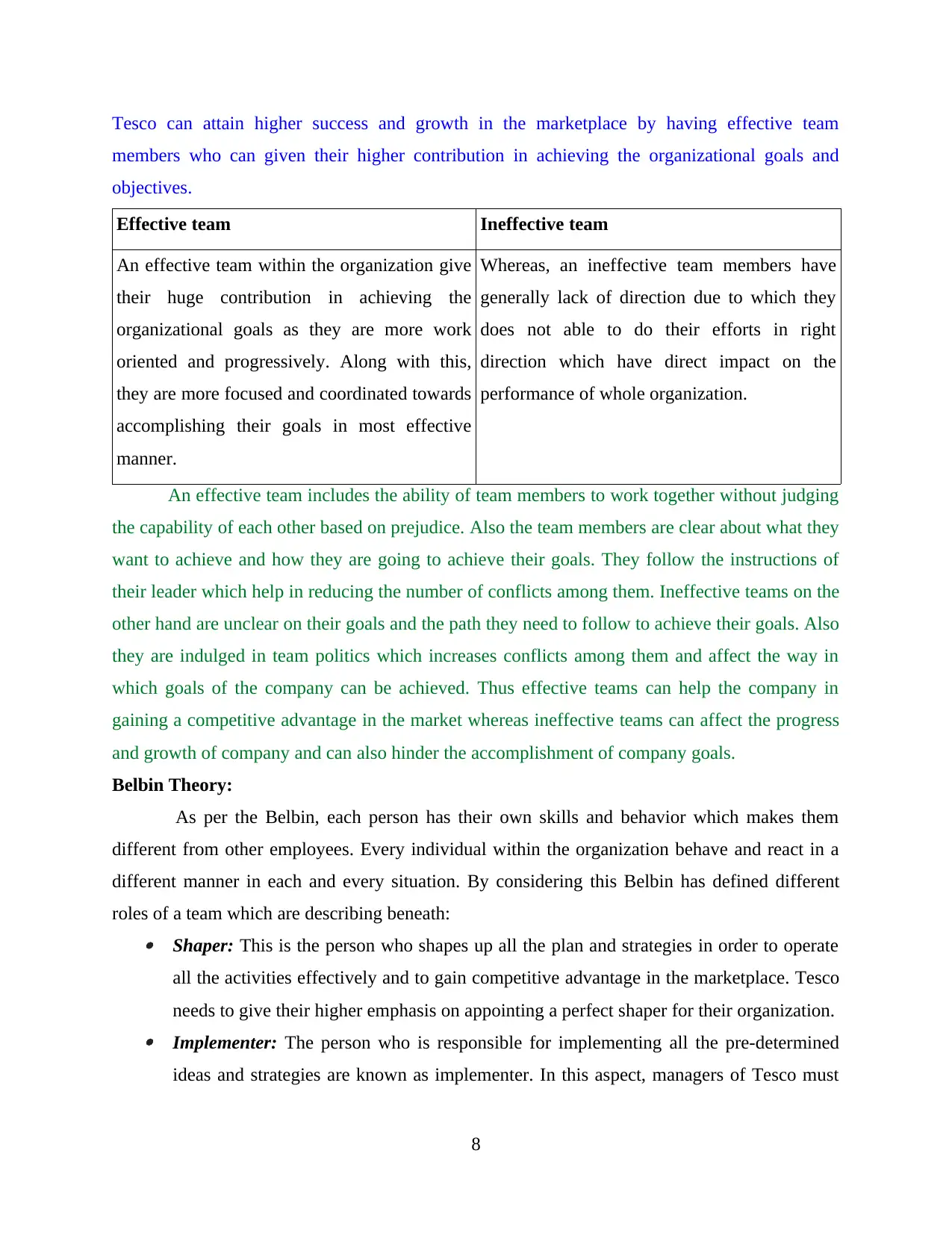
Tesco can attain higher success and growth in the marketplace by having effective team
members who can given their higher contribution in achieving the organizational goals and
objectives.
Effective team Ineffective team
An effective team within the organization give
their huge contribution in achieving the
organizational goals as they are more work
oriented and progressively. Along with this,
they are more focused and coordinated towards
accomplishing their goals in most effective
manner.
Whereas, an ineffective team members have
generally lack of direction due to which they
does not able to do their efforts in right
direction which have direct impact on the
performance of whole organization.
An effective team includes the ability of team members to work together without judging
the capability of each other based on prejudice. Also the team members are clear about what they
want to achieve and how they are going to achieve their goals. They follow the instructions of
their leader which help in reducing the number of conflicts among them. Ineffective teams on the
other hand are unclear on their goals and the path they need to follow to achieve their goals. Also
they are indulged in team politics which increases conflicts among them and affect the way in
which goals of the company can be achieved. Thus effective teams can help the company in
gaining a competitive advantage in the market whereas ineffective teams can affect the progress
and growth of company and can also hinder the accomplishment of company goals.
Belbin Theory:
As per the Belbin, each person has their own skills and behavior which makes them
different from other employees. Every individual within the organization behave and react in a
different manner in each and every situation. By considering this Belbin has defined different
roles of a team which are describing beneath: Shaper: This is the person who shapes up all the plan and strategies in order to operate
all the activities effectively and to gain competitive advantage in the marketplace. Tesco
needs to give their higher emphasis on appointing a perfect shaper for their organization. Implementer: The person who is responsible for implementing all the pre-determined
ideas and strategies are known as implementer. In this aspect, managers of Tesco must
8
members who can given their higher contribution in achieving the organizational goals and
objectives.
Effective team Ineffective team
An effective team within the organization give
their huge contribution in achieving the
organizational goals as they are more work
oriented and progressively. Along with this,
they are more focused and coordinated towards
accomplishing their goals in most effective
manner.
Whereas, an ineffective team members have
generally lack of direction due to which they
does not able to do their efforts in right
direction which have direct impact on the
performance of whole organization.
An effective team includes the ability of team members to work together without judging
the capability of each other based on prejudice. Also the team members are clear about what they
want to achieve and how they are going to achieve their goals. They follow the instructions of
their leader which help in reducing the number of conflicts among them. Ineffective teams on the
other hand are unclear on their goals and the path they need to follow to achieve their goals. Also
they are indulged in team politics which increases conflicts among them and affect the way in
which goals of the company can be achieved. Thus effective teams can help the company in
gaining a competitive advantage in the market whereas ineffective teams can affect the progress
and growth of company and can also hinder the accomplishment of company goals.
Belbin Theory:
As per the Belbin, each person has their own skills and behavior which makes them
different from other employees. Every individual within the organization behave and react in a
different manner in each and every situation. By considering this Belbin has defined different
roles of a team which are describing beneath: Shaper: This is the person who shapes up all the plan and strategies in order to operate
all the activities effectively and to gain competitive advantage in the marketplace. Tesco
needs to give their higher emphasis on appointing a perfect shaper for their organization. Implementer: The person who is responsible for implementing all the pre-determined
ideas and strategies are known as implementer. In this aspect, managers of Tesco must
8
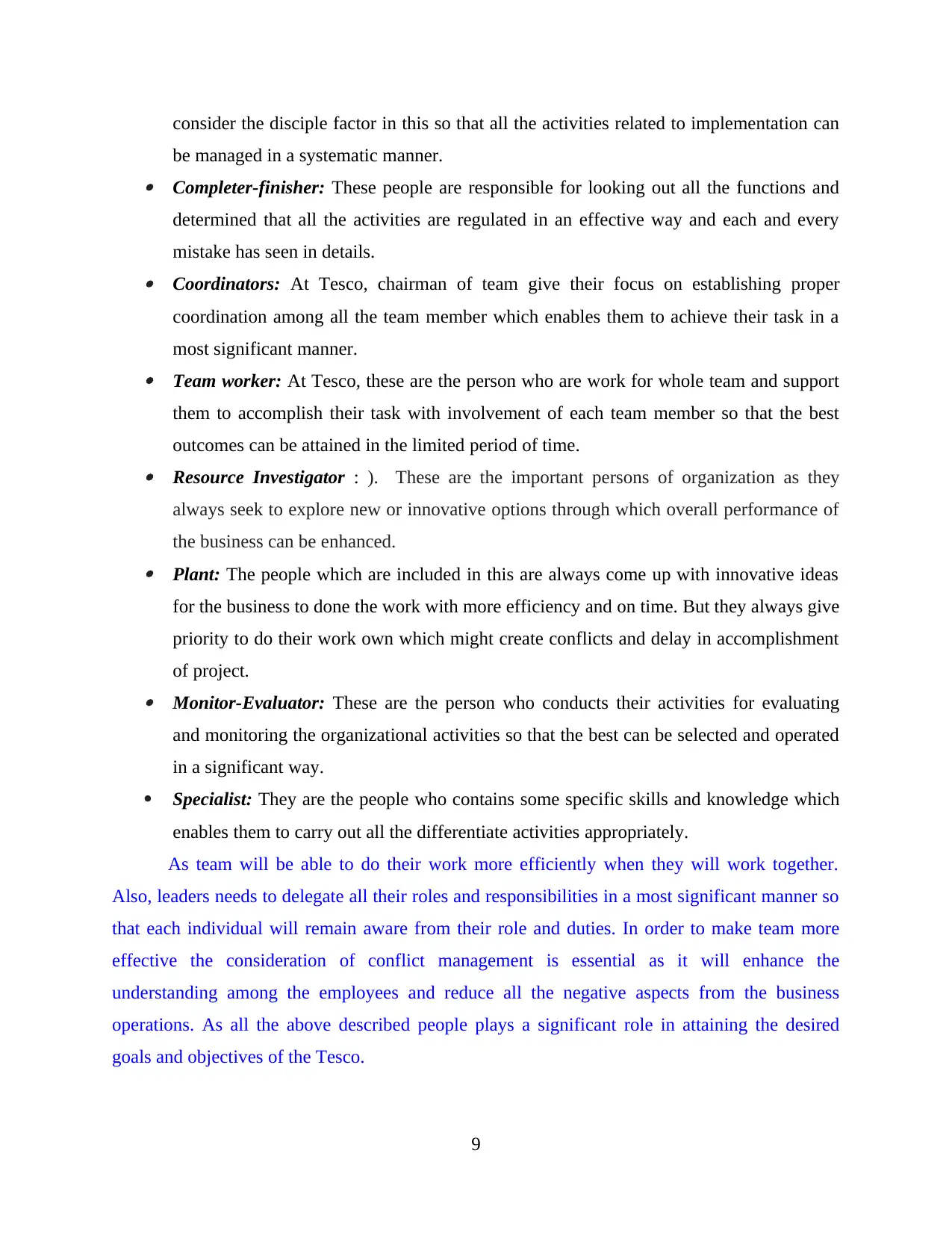
consider the disciple factor in this so that all the activities related to implementation can
be managed in a systematic manner. Completer-finisher: These people are responsible for looking out all the functions and
determined that all the activities are regulated in an effective way and each and every
mistake has seen in details. Coordinators: At Tesco, chairman of team give their focus on establishing proper
coordination among all the team member which enables them to achieve their task in a
most significant manner. Team worker: At Tesco, these are the person who are work for whole team and support
them to accomplish their task with involvement of each team member so that the best
outcomes can be attained in the limited period of time. Resource Investigator : ). These are the important persons of organization as they
always seek to explore new or innovative options through which overall performance of
the business can be enhanced. Plant: The people which are included in this are always come up with innovative ideas
for the business to done the work with more efficiency and on time. But they always give
priority to do their work own which might create conflicts and delay in accomplishment
of project. Monitor-Evaluator: These are the person who conducts their activities for evaluating
and monitoring the organizational activities so that the best can be selected and operated
in a significant way.
Specialist: They are the people who contains some specific skills and knowledge which
enables them to carry out all the differentiate activities appropriately.
As team will be able to do their work more efficiently when they will work together.
Also, leaders needs to delegate all their roles and responsibilities in a most significant manner so
that each individual will remain aware from their role and duties. In order to make team more
effective the consideration of conflict management is essential as it will enhance the
understanding among the employees and reduce all the negative aspects from the business
operations. As all the above described people plays a significant role in attaining the desired
goals and objectives of the Tesco.
9
be managed in a systematic manner. Completer-finisher: These people are responsible for looking out all the functions and
determined that all the activities are regulated in an effective way and each and every
mistake has seen in details. Coordinators: At Tesco, chairman of team give their focus on establishing proper
coordination among all the team member which enables them to achieve their task in a
most significant manner. Team worker: At Tesco, these are the person who are work for whole team and support
them to accomplish their task with involvement of each team member so that the best
outcomes can be attained in the limited period of time. Resource Investigator : ). These are the important persons of organization as they
always seek to explore new or innovative options through which overall performance of
the business can be enhanced. Plant: The people which are included in this are always come up with innovative ideas
for the business to done the work with more efficiency and on time. But they always give
priority to do their work own which might create conflicts and delay in accomplishment
of project. Monitor-Evaluator: These are the person who conducts their activities for evaluating
and monitoring the organizational activities so that the best can be selected and operated
in a significant way.
Specialist: They are the people who contains some specific skills and knowledge which
enables them to carry out all the differentiate activities appropriately.
As team will be able to do their work more efficiently when they will work together.
Also, leaders needs to delegate all their roles and responsibilities in a most significant manner so
that each individual will remain aware from their role and duties. In order to make team more
effective the consideration of conflict management is essential as it will enhance the
understanding among the employees and reduce all the negative aspects from the business
operations. As all the above described people plays a significant role in attaining the desired
goals and objectives of the Tesco.
9
⊘ This is a preview!⊘
Do you want full access?
Subscribe today to unlock all pages.

Trusted by 1+ million students worldwide
1 out of 16
Related Documents
Your All-in-One AI-Powered Toolkit for Academic Success.
+13062052269
info@desklib.com
Available 24*7 on WhatsApp / Email
![[object Object]](/_next/static/media/star-bottom.7253800d.svg)
Unlock your academic potential
Copyright © 2020–2026 A2Z Services. All Rights Reserved. Developed and managed by ZUCOL.





